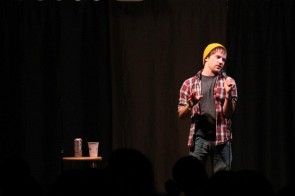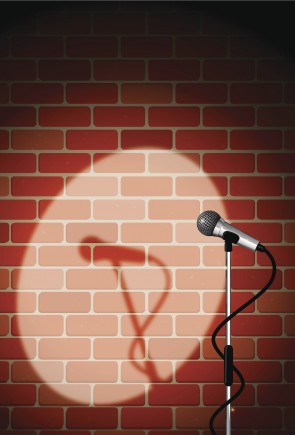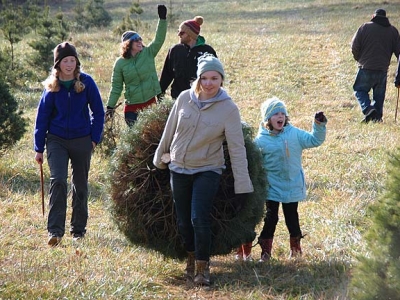BLOG — A stand-up guy doing stand up comedy
- Published: September 2, 2015
I met Rew Johnson in passing a few years ago when he lived with a friend of mine. My friend told me that Rew was moving to Dayton to pursue stand up comedy more seriously. Seeing someone go for it wholeheartedly is always inspiring, and I thought it was incredible and really cool that he was so invested in his craft. Stand up comedy is an art form I’m not terribly familiar with, so I was curious to know more about how it works and about the ins-and-outs of the life of a burgeoning comic. I re-met Rew when I moved to Yellow Springs, and he was nice enough to submit to an interrogation that I had been waiting years to do.
I’ve done hundreds of stand up sets. I did it for eight years. I was probably on stage between one hundred and two hundred times per year. I was just living for it. You do comedy and there’s nothing else. I’d drive and do a show in Louisville on a Wednesday night, then I’d drive home and get in at three or four in the morning and have to work at ten. Then I’d go to Indianapolis the next night. I’d work so I could pay to do comedy.
I did theater growing up and loved the stage and the attention and the rush that you get. I also loved writing growing up. I always thought I was going to be a writer. But in stand up, you’re the writer, you’re the performer, you’re the whole deal – you don’t share the stage with anyone else. It’s a selfish medium. You have to have a bit of an ego to even think about doing it.
The first stand up I started watching in high school were specials on Comedy Central, and this guy Mitch Hedberg really made me laugh. He piqued my interest in stand up, so then I started listening to other guys, like Steve Martin. I ended up doing stand up my junior and senior years of high school at my high school’s talent show.
My material in high school was terrible. (Laughs) It was bathroom humor. I had a joke about skydiving for the first time. [Evidently this is a corny topic. – DTL] I have it recorded on a VHS tape, and I watched it about two years ago. I couldn’t even sit through it.
I didn’t win the talent shows but a week after my senior show somebody sent me a $50 check and told me to keep going. I graduated high school in May of 2006 and got on stage at an open mic for the first time in June, at Wiley’s in downtown Dayton.
I’ve heard other comics use this analogy, but it’s like, starting a career in stand up is like going back to kindergarten, and it really takes ten or twelve years to become a decent stand up. I really do mean decent; I don’t mean skilled, I mean passably good. And after that, you’re going to college. So when you’re watching guys like Louis CK or Bernie Mac or Bill Burr and everyone’s like, I love this new guy, no, that guy’s been out on the road for twenty years.
When you start doing open mics, you need five minutes of material. In the early years, you try to build on those five minutes until they become fifteen. If you can write well enough and fast enough, you get into situations where you are billed as ‘featuring’ that night, where you do twenty- or thirty-minute sets. Then you build a long enough set from there and you’re headlining, doing forty-five minutes or an hour-long set.
The general rule amongst comics is that you open strong and end strong. Almost every set, my first joke was the same joke. I’d change it up in the middle. I’d change it up if I felt like doing something different, or if there was something I wanted to work on, I’d put it in the middle. But you always end those last five or ten minutes with something that you know will make people go, ‘that dude was hilarious’ when you get off the stage.
I’d say I kept about 60% of the jokes I wrote. But when you’re doing stand up so much, you start to get tired of your jokes pretty quickly. That’s a good motivation to write more and keep being creative. But I’d also have a joke that I’d been doing for two years and then for whatever reason find three more minutes to add to it. That’s what’s really cool about stand up – your act is constantly evolving. A joke is never really finished. There’s no final brushstroke you can put on it.
I gauged what jokes were funny or not by just doing it as much as possible, and watching jokes die. (Laughs) There is a lot of in the moment trial-and-error. I don’t think you ever get used to it. Cause you can have a joke that works 99.9% of the time and for whatever reason do a show and watch it fall on its face.
When you’re trying to do something you’ve worked so hard on, something that you really love, having a roomful of people look at you like you’re an idiot – that’s pretty hard. The thing about stand up is that you can have a set where you totally dominate and you’ll be on that high for two or three hours, enjoying it until you go to sleep. But you have a bad set and you’ll be thinking about it for three weeks. That’s another part of the reason I think so many comics are messed up mentally – it’s self-abuse. You put yourself through that – it’s necessary for the art form but it’s incredibly self-abusive.
It’s like Jerry Seinfeld said – people’s number one fear is public speaking; number two is death. He says, given the choice, at a funeral you’d rather be in the coffin than giving the eulogy.
I could usually tell within the first thirty seconds how the whole show was going to go. I had many shows where I thought it was going to be great, and as soon as I walked on stage I knew it was not. Or vice versa. I was chain-smoking and pacing and not wanting to go up, but for some reason you go up there and you kill it.
 I think the real beauty in stand up is that you rehearse the material and you rework it and rework it, but there’s always those nights where it’s magic; everything flows together and it’s a moment, like jazz, and then it’s gone. Those moments are special. That doesn’t happen very often. You can’t anticipate it.
I think the real beauty in stand up is that you rehearse the material and you rework it and rework it, but there’s always those nights where it’s magic; everything flows together and it’s a moment, like jazz, and then it’s gone. Those moments are special. That doesn’t happen very often. You can’t anticipate it.
The longest I was on stage was an hour and forty-five minutes. It was just a show at a bar in Columbus and I was just…on fire. I was just killing it. For whatever reason the circumstances were right. I wound up riffing on stuff going on in the room. At one point I looked at my watch, like ‘how long have I been up here.’ I thought it maybe had been an hour but it had been an hour and a half.
It comes down to the audience. I think comedy audiences are maturing, but they view comedians not as artists but as trained monkeys. That translates to what they expect to you, like ‘make me laugh.’ Some people go to a comedy show and they don’t want to hear your opinion. They just want to hear you talk about, you know, the differences between men and women or whatever.
Those subjects can definitely be hackneyed material, but at the same time, they are universal truths. “Men and women are different” – someone’s got a new take on it and can make it funny. But there are hackneyed jokes, like when am comic says “I hate having to listen to my girlfriend,” and does an impression of her voice for a long time. Thousands and thousands of comedians have done that joke, but there’s always somebody who’s going to put a fresh spin on it. Drug jokes are another topic like that – it’s easy to make people laugh if you are talking about getting drunk or smoking pot. “Oh, I was so drunk I acted like an idiot hahaha.” But Louis CK has a bit about getting high that he did on a comedy special a few years ago, and it’s hilarious.
I was unique in that my family was incredibly supportive. My parents came to quite a few of my shows. I did meet a lot of guys unfortunately whose parents are like, why are you wasting your time? Go get a job-job. I can’t even imagine [how difficult that is] – it’s already hard enough being a comic.
Stand up is definitely therapy on some level. I definitely treated it as therapy sometimes, which can be good and bad. People who have the greatest sense of humor also have the greatest insight into the darkest and most painful areas of life. That’s why you can sit in a room full of military vets and hear them joke about the most morbid stuff. What they’re doing is coping. It’s the same thing with amputees – I’m an amputee – and I’ve made jokes with other amputees that people might grimace at but to me, it’s…a joke.
When I was writing well, I was writing about stuff that I cared about and usually stuff that I cared about was stuff that really irritated me. Like, I had a roommate that ended up being completely racist, and living with him for a while ended up becoming a ten-minute bit that I had. And I wrote it in about three minutes; I was just that impassioned. It just came out of me.
By the end, I stopped physically – I would have an idea in my head and just walk around my kitchen and basically talk through it and find the tag, or the punchline, and build on it. That process, instead of sitting down with a piece of paper, caused me to write material that sounded more natural and not just packaged and ready to go out.
It was also a lot easier to remember. Rather than writing something down and treating it like it was a monologue from a play, if you talk it out, you’re talking the way you talk to your friend on the street. Because it came more naturally, it stuck to your brain a little better.
One of my favorite shows was at a thrift store in Cincinnati that was owned by this couple. We had shows there for about six months. We didn’t get paid but they would make us dinner. We had a blast – it was a room full of forty college kids in what was basically a Salvation Army, watching stand up.
Another one of my favorite memories is the time I got booed off stage. (Laughs) I have it on video somewhere. It was really early on when I started doing stand up, and I was doing this Andy Kaufman kind of character. I was basically playing a fifteen year-old boy who was trying to tell jokes. The audience didn’t understand the character; they really thought I was a fifteen year-old boy. And they booed me off stage. (Laughs) The best part was that I came to the club dressed as this character and stayed in character this whole time. I get booed off stage and the owner of the club comes up and gets on stage and yells at the audience, this one table in particular was doing it, and he yells at them like, ‘you guys should be ashamed! This kid was trying his best!’ etc. He ended up kicking out like seven people. (Laughs) I watched that happen and kind of felt bad because he probably lost money. I came up to the owner after the show was over and was in my normal clothes at that point and apologized to him. I said, ‘I’m really sorry about that.’ He said, ‘no, it’s alright, you had nothing to do with it.’ And I said, no, I did, that was me. He said, don’t worry about it. And I said, no, that kid in the hat – that was me. And he looked at me for like five seconds and was like ‘dude, get out of here, I don’t want to talk to you.’
Success in stand up is fifty percent merit and fifty percent networking, taking chances and making opportunities and booking gigs. I’ve gotten a lot of opportunities to work with people I really look up to. Some of my heroes. Two guys that have since made a name for themselves – Kyle Kinane and Hannibal Burress – I had a chance to open for them. In terms of a comic’s career, they were both pretty damn successful when I met them. And both of them introduced themselves by their first names to me. I shook their hands and didn’t say it, but I was thinking to myself, I know who the hell you are. They treated me like a human being.
I’ve also worked with guys who’d been doing stand up for twenty or twenty-five years and never caught their break. They were just bitter, and had an arrogance to compensate for their own insecurity about not being successful. But that’s the nature of the game. I mean, comics are just people – some of them are nice, some of them are jerks.
In all the shows I’ve done, I can probably count the hecklers I’ve encountered on two hands. For the most part, they’re really easy to handle. It becomes hard when they’re just an idiot and completely wasted and they just refuse to shut up. But in a club setting, if the club is run well, the staff usually handles it. Sometimes people would just say things in the middle of a show because they’re enjoying it so much, and it wasn’t really a heckle. I never had a problem with that, as long as it wasn’t through my entire set. And sometimes it led to really great opportunities for riffing on stuff.
I think stand up has definitely made me more assertive overall. When you’re talking, you think about what you want to say, even if it’s only for half a second. At some point during my years of doing stand up, the connection between my mouth and brain streamlined itself. I mean, I would say something on stage in response to somebody and I’d think, where the hell did that come from? I’d have to play it off but I’d be thinking, that was awesome! (Laughs)
Long term, I didn’t think stand up was what I wanted. I’d like to have a family and all that stuff some day. You can make a living being what they call a ‘road comic.’ You’ll have a home base but be on the road forty, forty-five weeks out of the year, driving or flying to different clubs. Some comics can do it, but I didn’t want to have kids and be on the road ten months out of the year. You either have to do that or move to a large city, and I didn’t really want to do that either. And I didn’t want to spend all my time in bars.
As a comic, you’re self-employed, you’re your own business. You’re always doing open mics, trying to get on stage as often as possible, trying to work on your set. Starting out, I definitely did a lot of show for free drinks. There were definitely nights where you’re like, I drove three hours last night to do a show to three people for no money and I had a horrible set and now I’m tired at work – why am I doing this?
But I don’t regret doing it. I basically had an eight-year-long adventure. Traveling as much as I did when I did was neat. And so was getting exposed to different people in our country. And those last two years, I was definitely getting paid more often than not. For every bad memory, there are a thousand good ones. I did one set in January this year. I was surprised at how easy it was to jump back into it.
The Yellow Springs News encourages respectful discussion of this article.
You must login to post a comment.
Don't have a login? Register for a free YSNews.com account.

















No comments yet for this article.